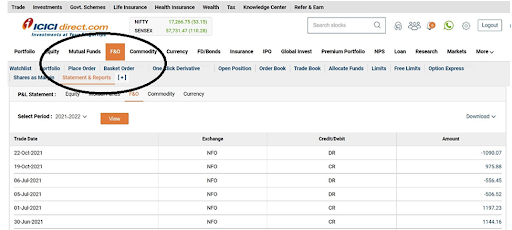What is the tax to be paid for F&O trades?
Hello friends lets understand most complicated subject for F&O traders
F&O income may start getting the same tax treatment as
lotteries and cryptocurrencies. Currently, income from F&O transactions is
treated as a business income and taxed according to in come slab slabs of
5%,20%, 30%
What is the tax to be paid for F&O trades?
Income from trading in F&O (both intraday or overnight) on all the recognized exchanges (such as NSE, BSE, MCX etc) is considered as non-speculative business income f&O TRADE. is reported under the head ‘Business’ in Income Tax Return (“ITR”) and information is given as per the frequency or volumes of trades done.
What
is the turnover in derivatives?
Turnover
is calculated as the difference of total of positive and negative values for
Futures segment. It makes no difference, whether the difference is positive or
negative. These values are aggregated and the turnover is calculated. With
respect to Options, Premium is to be included in turnover.
Let’s
take a look below examples
- If client bought & sold
RIL one lot Future contract and booked a profit of Rs. 50,000.
- If client bought & sold
TCS one lot Future contract & booked a loss is Rs. 25,000
- If client bought INFY 1700 CE
one lot at a premium of at Rs. 12,000.
- If client sold ITC 230 PE one
lot at a premium of Rs. 22,400.
The
turnover is calculated as Rs. 50,000 (Profit in RIL ) + 25,000 (Loss in TCS) +
buy premium of INFY CE Rs. 12,000 + sold ITC PE premium of Rs. 22,400 then
total turnover is Rs. 1,09,400.
Treatment
of losses in derivatives
Any
unadjusted loss in derivatives can be carried forward for eight years. However,
in the future, they can only be adjusted from non-speculative income. If
there is a loss in F&O, then one should file it before due date to carry
forward the loss and set off from income in the future. The single most
important reason to file F&O trading is to be able to benefit from losses
you have incurred. If your business resulted in a loss, report it in your tax
return. It can be adjusted from income from remaining heads such as rental
income or interest income (it cannot be adjusted from salary income).
When
is derivative tax audit required?
TAX Audit
in the case for Futures & Options (F&O) is applicable in the below two scenarios:
-
1.The
turnover is more than Rs. 10 crores (audit applicability increased from Rs.5
crores to Rs.10 crores in Budget 2021). The threshold of Rs.10 crores is
applicable for F&O as 95% of the transactions are through digital mode.
Hence, the standard audit threshold of Rs.1 crore is not applicable in case of
F&O.
2.The
audit is required only if a taxpayer has declared income at a presumptive rate
(Section 44AD) in any of the previous five years but wants to declare losses or
income at less than the presumptive rate in the current year, provided his
total income in the current year exceeds the basic exemption limit.
What are types of ITR forms and where
do I fill Derivatives Income Tax?
ITR-
3 for individuals and HUFs having income from profits and gains of business or
profession.
ITR-4
for Individuals, HUFs and Firms (other than LLP) who are eligible to opt
‘Presumptive taxation scheme’.
How
can I file tax if I am a small trader & do not maintain Books of account?
This
is applicable to Business/Profession whose gross receipts /revenue is less than
or equal to ₹25 Lakhs (10 Lakhs for Profession) and profit is less than or
equal to ₹2.5 Lakhs (1.5 Lakhs for Profession)
What documents are required for tax
filing?
FORM 16 Form
26AS Tax Credit Statement, trading account statement, Turnover report, profit
& loss, transaction statement, bank statement if interest received is above
Rs. 10,000/-, gross receipts & Income and Expense statements.
What is advance tax and
when do I need to pay it?
The
assessment of income of a year can be made only after the year has passed,
advance tax is pre-payment of your tax liability in the year it is earned. If
the tax liability is more than Rs 10,000 in a financial year then advance tax
needs to be paid by assessee. The dates are June 15, September 15,
December 15 and March 15 are the dates to pay advance tax.
How are
Open position/ closing position on 31st March
considered for calculation of P&L?
Open
interest refers to a situation, wherein on the date of the financial year end,
there are outstanding derivatives contracts with the customer. Since
derivatives contracts are marked-to-market (MTM), there can be unrealized MTM
gains or losses prevailing as on March 31.
Only
real income/loss attracts tax provisions and not the notional gains/losses.
However, in certain judicial decisions notional losses have also been allowed
as a deductible expense. This is still debatable and there is no fixed rule
yet.
Expenses treatment
against F&O Income?
Expenses
like brokerage, broker’s commission, subscriptions to journals related to
trading, telephone bills, internet costs, consultant charges if you took an
advice from a professional who charged you, or salary of a person you hired to
help with your business can all be claimed.
Where can client see profit and loss statement
YOU CAN YOU BACK OFFICE – OF YOUR BROKER YOU HAVE SELECTED
Can clients use P&L statement for
income tax return?
Yes,
clients can download statement for financial year & total is given in the
statement
Wise investing
Knowledge is power







Comments
Post a Comment
If you have any doubt let me know about investing & different trading ideas